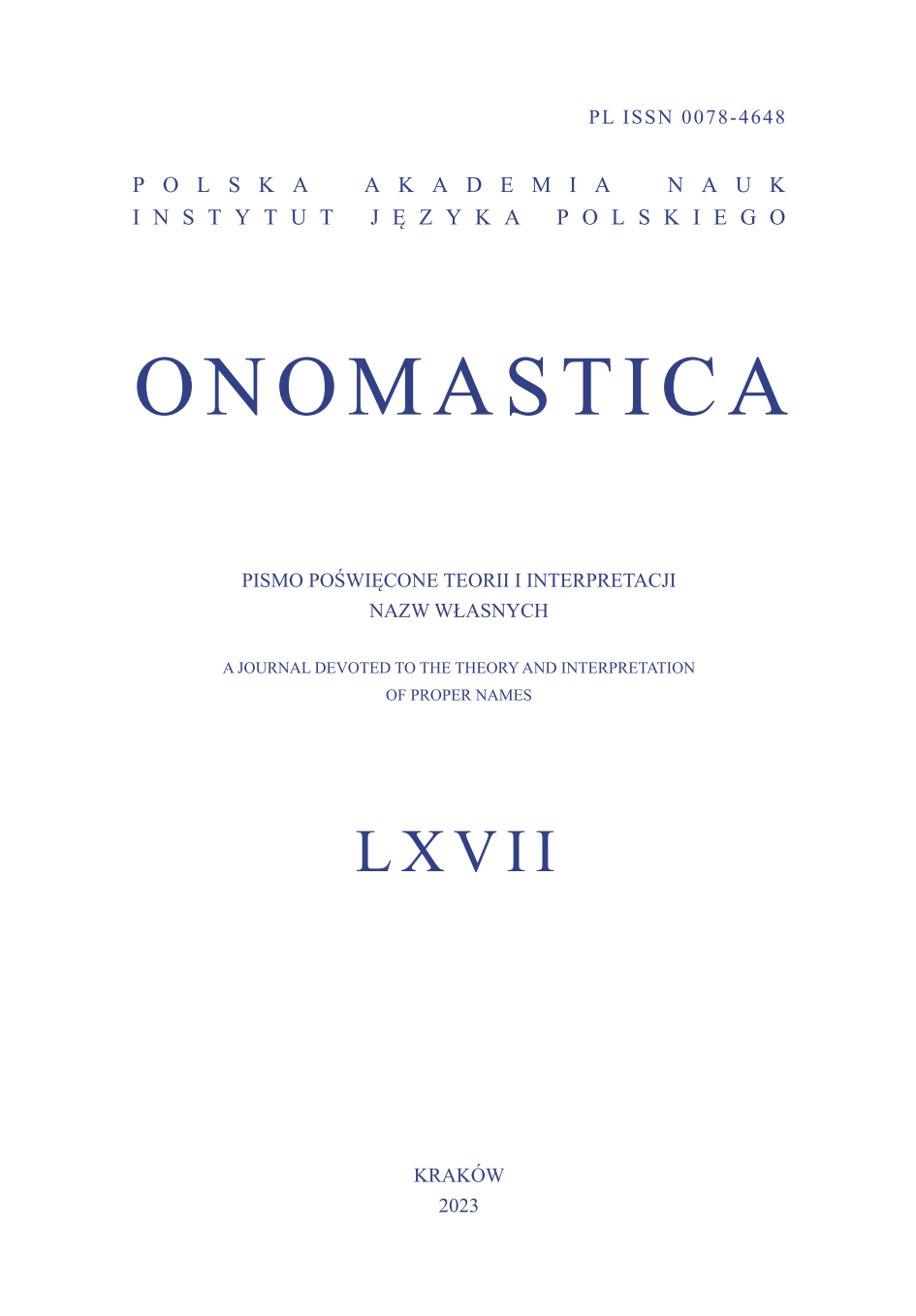Abstract
This paper discusses the existence of two different systems of naming used among the Vlachs of Eastern Serbia: a private one, based on their Vlach patronyms, used exclusively in their home villages and transmitted only orally, and an official, Serbian one. After presenting an overview of Romanian names and naming practices in the 18 th –19 th centuries, with a focus on the double naming system, the author explains how the Vlachs kept their Vlach patronyms after settling in Eastern Serbia, and how the second, official naming system, was Serbianized over time. In the second half of the paper, the author focuses on the recent phenomenon of the private, Vlach name gaining visibility and being used in writing, starting with the turn of the millennium, based on a variety of data sets. The increased visibility of the Vlach naming system reflects the recent increased prestige of the language, which was standardized and has started to be used in writing. The paper demonstrates that the double naming of the Vlachs reflects their dual, contextual identity, while the use in writing of the Vlach names signals an important shift in the attitude towards identity and language.
References
Constantinescu, N. A. (1963). Dicţionar onomastic român [Romanian onomastic dictionary]. Bucharest: Editura Academiei.
Dimitrijević-Rufu, D. (1998). The Multiple Identity of Romanians in Melnica (Homolja, Serbia). In C. de Bussy & P. H. Stahl (Eds.), Name and Social Structure: Examples from Southeast Europe (pp. 49–68). Boulder: East European Monographs.
Djordjević, T. (1906). Kroz naše Rumune. Putopisne beleške [Among our Romanians: Travel notes]. Srpski književni glasnik, 16(1), pp. 44–58. https://ia800500.us.archive.org/0/items/SrpskiKnjizevniGlasnik.V.16/SrpskiKnjievniGlasnik.V.161906.pdf
Durlić, P. Es. (2020). Rumânji în zovîrnjit đi suare/ Vlasi na zalasku sunca [The Vlachs at sunset]. Majdanpek: Pekus.Durlić, P. Es. (in press). Iredenta reviva: Kad je znanje vlaškog spašavalo glavu [Iredenta reviva: When knowledge of Vlach saved one’s life].
Finch, J. (2008). Naming Names: Kinship, Individuality and Personal Names. Sociology, 42(4), 709–725. https://doi.org/10.1177/003803850809162
Glišić, J. (2017). Românii din Serbia de Răsărit în perioada 1718 până azi. Între asimilare și identitate [The Romanians from Eastern Serbia from 1718 until today. Between assimilation and identity] [Doctoral dissertation, Babeș-Bolyai University in Cluj-Napoca]. Rei — Teze de doctorat publice. https://rei.gov.ro/teza-doctorat-document/847965e733a196f14e-22.Teza-Glisici.pdf
Graur, A. (1965). Nume de persoane [Personal names]. Bucharest: Editura Ştiinţifică.
Hanks, P., & Parkin, H. (2016). Family names. In C. Hough (Ed.), The Oxford Handbook of Names and Naming (pp. 214–223). Oxford: Oxford University Press. https://doi.org/10.1093/oxfordhb/9780199656431.013.9
Huțanu, M. (2021). Performing Vlach-ness Online: The Enregisterment of Vlach Romanian on Facebook. In A. Sorescu-Marinković, M. Dragnea, T. Kahl, B. Njagulov, D. L. Dyer, & A. Costanzo (Eds.), The Romance-Speaking Balkans: Language and the Politics of Identity (pp. 233–255). Brill.
Huțanu, M., & Sorescu-Marinković, A. (2018). Non-dominant varieties of Romanian in Serbia: between pluricentricity and division. In R. Muhr & B. Meisnitzer (Eds.), Pluricentric Languages and Non-Dominant Varieties Worldwide: New pluricentric languages — old problems (pp. 233–246). Frankfurt a. M.: Peter Lang.
Huțanu, M., & Sorescu-Marinković, A. (2023). Changing the Linguistic Landscape: Vlach Romanian in Eastern Serbia. Teme. Journal for Social Sciences, 47(1), 69–86. https://doi.org/10.22190/TEME211018006H
Iordan, I. (1983). Dicționar al numelor de familie românești [Dictionary of Romanian family names]. Bucharest: Editura Științifică și Enciclopedică.
Knežević, A. (2019). Maternji jezik kao determinanta etničkog identiteta u popisima stanovništva Srbije [Mother tongue as a determinant of ethnic identity in population censuses of Serbia]. Annales. Series Historia et Sociologia, 29(3), 455–472. https://www.dlib.si/details/URN:NBN:SI:DOC-MVDAW2YQ
Mirić, M. (2022, December 12–13). On the vulnerability of Romani in Serbia with regard to the type of the community [Paper presentation]. Minority and Endangered Languages in the Multilingual Context of the Balkans (MELMUB). Ca’ Foscari University of Venice, Italy. https://doi.org/10.5281/zenodo.7578950
Novaković, I., & Djurdjević, N. (2015). Srpsko-rumunski odnosi i status vlaške nacionalne manjine u Srbiji. Studija praktične politike [Serbian-Romanian relations and the status of the Vlach national minority in Serbia. Study of practical politics]. Belgrade: ISAC Fond. https://www.isac-fund.org/download/SR-RU-Odnosi.pdf
Ocetea, A. (1979). Istorija rumunskog naroda [The history of the Romanian people]. Novi Sad: Matica Srpska.
Pașca, Ș. (1936). Nume de persoane și nume de animale în Țara Oltului [Names of people and animals in Tara Oltului]. Bucharest: Academia Română.
Sokolović, D., & Paunović Rodić, S. (2022, May 25–27). “Project ‘Vulnerable Languages and Linguistic Varieties in Serbia’ — linguacultural aspects of the questionnaires” [Paper presentation]. Lingwokulturologia w glottodydaktyce i badaniach językoznawczych. Akademia Humanistyczno-Ekonomiczna w Łodzi, Poland. https://doi.org/10.5281/zenodo.7376643
Sorescu-Marinković, A. (2022). Biserică, religiozitate populară și oameni ai locului. O perspectivă din Serbia de Răsărit [Church, vernacular religion, and local people: A view from Eastern Serbia]. Anuarul Arhivei de Folclor, 25–26, 313–332. https://hdl.handle.net/21.15107/rcub_dais_13979
Sorescu-Marinković, A., Mirić, M., & Ćirković, S . (2020). Assessing Linguistic Vulnerability and Endangerment in Serbia: A Critical Survey of Methodologies and Outcomes. Balcanica, 51, 65–104. https://doi.org/10.2298/BALC2051065S
Sorescu-Marinković, A., & Huțanu, M. (2023). The Vlachs of Eastern Serbia: Language and Society. Vienna: ÖAW.
Stahl, H. H. (1934). Sistemul onomastic drăgușan. Regula ‘gineririi pe curte’ [The onomastic system of the Drăguș Village: The Rule of the ‘son-in-law to be’]. Arhiva pentru știința și reforma socială, 12(1–2), 83–95. https://sas.unibuc.ro/storage/downloads/studii-de-comunitate-28/HHS34a.ONOMASTIC.pdf


